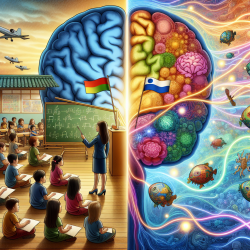Early bilingual immersion programs have shown varied effects on cognitive development in children, depending on the second language learned and the duration of exposure. The study "Early bilingual immersion school program and cognitive development in French-speaking children: Effect of the second language learned (English vs. Dutch) and exposition duration (2 vs. 5 years)" provides valuable insights for practitioners looking to optimize educational outcomes for children.
This study examined 230 French-speaking children in second and fifth grades, comparing those immersed in English, those immersed in Dutch, and a non-immersed control group. The researchers assessed executive functions (EF) such as alerting, cognitive flexibility, and working memory, along with arithmetic abilities.
Key findings include:
- Second Grade: No significant differences in EF were observed between the groups. However, Dutch learners outperformed the monolingual group in arithmetic tasks.
- Fifth Grade: Both immersion groups showed superior cognitive flexibility compared to the control group, with Dutch learners also excelling in working memory and arithmetic tasks.
These results suggest that the cognitive benefits of bilingual immersion programs become more apparent with increased exposure and are influenced by the specific second language learned. For instance, Dutch immersion seems to enhance working memory more effectively than English immersion, possibly due to the linguistic and syntactic differences between Dutch and French.
Practitioners can apply these findings by:
- Encouraging extended exposure to bilingual immersion programs to maximize cognitive benefits.
- Selecting second languages that offer significant linguistic challenges to stimulate cognitive development.
- Integrating additional cognitive tasks into the curriculum to further enhance EF skills.
Future research should focus on longitudinal studies to track cognitive and academic progress over time and explore the impact of extracurricular language exposure. Understanding individual differences, such as motivation and learning strategies, can also help tailor educational approaches to maximize benefits.
To read the original research paper, please follow this link: Early bilingual immersion school program and cognitive development in French-speaking children: Effect of the second language learned (English vs. Dutch) and exposition duration (2 vs. 5 years).










